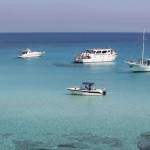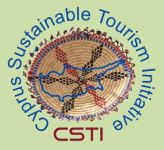| Good Practice Innovation Sheet |
  |
| Items |
Description |
| 1. WHO |
| Key people and organisations (initiator, leader, partners) |
Coastal and Marine Union EUCC and Cyprus Government |
| |
| |
| Key Figures |
Surface |
Inhabitants |
Tourism arrivals |
Tourism nights |
| 1,393 km² |
88,276 |
N/A |
N/A |
| 2. WHY |
| Reason for taking the good practice action |
The hospitality sector contributes greatly to the generation of waste. While in residential areas of Cyprus 468kg of solid waste is produced per person on average per year, this number is more than one third higher in tourist areas, and estimated 680kg. In addition, the limited number of recycling facilities contributed to more than 85% of the solid waste generated on the island is disposed of in landfills. Besides this, as consumers become increasingly concerned about environmental issues, they demand more sustainable and responsible businesses when planning their holidays. For these reasons, in Paphos, where tourism constitutes the main economic activity, reducing the environmental impacts of waste has become an important issue to be considered by the hospitality sector in order to improve their sustainability performance and gain competitive advantage. |
| Issues and challenge |
Engaging hotels to adopt sustainable practices and obtaining monitoring data was proved to be the biggest challenges. Initially it was expected that 50 hotels would join the programme, but at the end only 28 did participate. Of them, 7 hotels did not provide sufficient data to be included in the final analysis. One of the common obstacles to implement an environmental strategy was convincing hoteliers that the practices taken would not affect negatively on their guests’ holiday experience. |
| 3. HOW |
| Methods /steps / tools used (to develop the good practice) |
A campaign to reduce the use of plastic items in Paphos was launched by Thomas Cook in collaboration with the Travel Foundation and the Cyprus Sustainable Tourism Initiative. In 2010, three hotels and five self-catering properties in Paphos District participated in this initiative. The success of the initiative led to a large number of hotels agreeing in to participate in 2011. During 2010 summer seasons, 4500 reusable cloth bags were produced and distributed to costumers aiming to reduce the use of plastic bags. To promote the initiative those who used the bags when shopping had the opportunity to enter into a price draw to win a voucher for GBP 200 off their next holidays. As part of a new plastic waste reduction strategy several actions were implemented by hotels. These included, among others, using durable cups for water, replacing bottled water with drinking water dispensers, providing straws only when requested from costumers, using refillable dispensers for soap and shampoos, use of bin liners only in bathrooms, changing plastic liners only when soiled, purchasing cleaning materials in bulk and collecting garden waste in trolleys instead of plastic liners. Hotel employees were trained from housekeeping, maintenance and front office to reduce the use of plastic items, and circulate letters were sent to each guest and special notice board and signs in strategic areas were created to inform customers about the actions that were taken to reduce the amount of plastic used in the resort and encourage them to support the strategy. A project-coordinator was established in order to encourage hotels managers to take part in the this programme, identify the most appropriate practices, provide training to hotel staff and collect and analyse the data and customer surveys obtained from the hotels. |
| 4. RESULT |
| Specific/measurable results, benefits |
This initiative demonstrate that it is possible to reduce considerably the use of plastic and generate substantial financial saving by implementing low cost and simple waste management actions. In the 2011 season, such measures contributed to reduce the total number of plastic items used in hotels by 19%, achieving a total cost saving of 31.00€. It was estimated that by distributing re-usable bags in self-catering properties, 41,000 plastic supermarket bags were saved from ending up in landfill sites. Besides reducing waste and saving money, these practices had a very positive effect on staff and guests, raising their awareness and commitment with respect to the reduction of plastic. Customer questionnaires reflected that this initiative had a positive impact on their holiday experience and was an effective marketing tool for the participating hotels and the destinations. |
| Recognitions (e.g. awards) |
QualityCoast Gold Award 2012-‘13 |
| 5. REFLECTION |
| Lessons learned |
One of the main difficulties was obtaining data from the participating hotels in order to undertake the final analysis. Having a project coordinator was crucial for ensuring the active engagement of the establishments’ managers. This initiative proved to be very successful thanks to the strong commitment of the hotel managers in implementing plastic reduction practices and the training undertook with all departments. |
| Challenges met |
This initiative can be replicated in any destination. The success achieved has led some of the participating hotels to include further actions to reduce waste besides plastic items. The Travel Foundation has also developed other programmes aiming to reduce the consumption of water and energy in the hotel industry of the island. This independent charity in collaboration with the Cyprus Tourism Organisation and the Cyprus Sustainable Tourism Initiative has recently created an environmental guideline for meeting the Cyprus Tourism Organisation minimum standards for sustainability in hotel establishments. |
| Critical success factors |
|
| 6. MORE |
| web-references, documents |
www.qualitycoast.info/?page_id=669 |










 Paphos (CY)
Paphos (CY)
















































